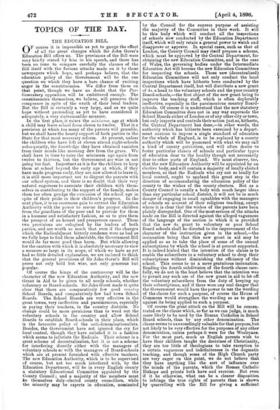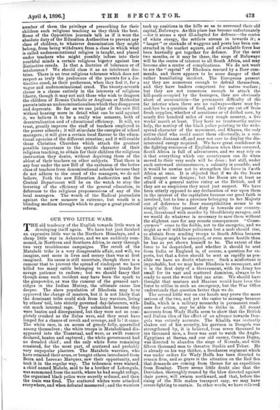TOPICS OF THE DAY.
THE EDUCATION BILL.
OF course it is impossible as yet to gauge the effect of all the great changes which Sir John Gorst's Education Bill offers us. The provisions of the Bill were very briefly stated by him in his speech, and there has been no time to compare carefully the clauses of the Bill itself with the furious attacks made on it by those newspapers which hope, and perhaps believe, that the education policy of the Government will be the one question on which they have a bare chance of exciting anger in the constituencies. We differ from them on that point, though we have no doubt that the Par- liamentary opposition will be embittered enough. The constituencies themselves, we believe, will preserve their composure in spite of the wrath of their local leaders. But the Bill is certainly a very large, and as we quite hope without pretending as yet to have considered it adequately, a very statesmanlike measure.
In the first place, it raises the minimum, age at which a child may leave school from eleven to twelve. That is a provision at which too many of the parents will grumble, but we shall have the hearty support of both parties in the State for that most necessary reform. At present, unless the children who have left at eleven attend night-schools subsequently, the knowledge they have obtained vanishes from their minds like morning dew from the grass. We shall have in time to raise the minimum age again from twelve to thirteen, but the Government are wise in not going too fast. Important as it is for the children to keep them at school beyond the early age at which, if they have made progress early, they are now allowed to leave it, it is still more important not to disgust the parents with our school system, and there is no doubt that their very natural eagerness to associate their children with them- selves in contributing to the support of the family, makes them too often grudge the extension of the school age in spite of their pride in their children's progress. In the next place, it is an enormous gain to entrust the Education Authority with the power to rescue the pauper children from the guardians of the poor and to provide for them in a humane and satisfactory fashion, so as to give them the prospect of an honest and prosperous career. These two provisions are eulogised by the leaders of both parties, and are worth so much that even if the changes which the Radicals*,most bitterly condemn were as bad as we fully hope to find them admirable, the Government Bill would do far more good than harm. But while allowing for the caution with which it is absolutely necessary to view a measure so large in its scope, of which we have as yet had so little detailed explanation, we are inclined to think that the general provisions of Sir John Gorst's Bill will prove not only bold but wise, not only generous but popular.
Of course the hinge of the controversy will be the character of the new Education Authority, and the new Grant in Aid to be given to all needy schools, whether voluntary or Board-schools. Sir John Gorst made it quite clear that there are comparatively few good country School Boards, and comparatively few bad town School Boards. The School Boards are very effective in the great towns, very ineffective and parsimonious, especially in paying their teachers, in the country districts. No change could be more pernicious than to weed out the voluntary schools in the country and allow School Boards to establish Board-schools in their place, which is the favourite policy of the anti-denominationalists. Besides, the Government have not ignored the cry for local control, though they have satisfied it in a fashion which seems to infuriate the Radicals. Their scheme is a great scheme of decentralisation, but it is not a scheme for interfering directly either with the managers of voluntary schools or with the managers of Board-schools which are at present furnished with effective teachers. The new Education Authority, which is to be supervised of course, but not too much interfered with, by the Education Department, will be in every English county a statutory Educational Committee appointed by the County Council ; and a majority of the members must be themselves duly-elected county councillors, while the minority may be experts in education, nominated by the Council for the express purpose of assisting the majority of the Committee in their work. It will be this body which will conduct all the inspections of schools now conducted by the Education Department itself, which will only retain a. general power to watch and disapprove or approve. In special cases, such as that of London, the County Council may itself prepare a scheme, which must be approved by the Central Department, for obtaining the new Education Committee, and in the case of Wales, the governing bodies under the Intermediate Education Act will become the new Education Committees for inspecting the schools. These new (decentralised) Education Committees will not only conduct the local inspections which have hitherto been conducted by the Central Department itself, but will distribute a new grant of 4s. a head to the voluntary schools and the poor country Board-schools,—the first object of the new grant being to improve the teaching staff, which is often deplorably ineffective, especially in the parsimonious country Board- schools. Of course it is understood that the new statutory Education Committee does not in any way supersede the School Boards either of London or of any other city or town, but only inspects and controls their action just as, hitherto, the Central Department has done,—in other words, the authority which has hitherto been exercised by a depart- ment anxious to impose a single standard of education for the whole of England, is to be .replaced by a county authority which will be possessed with what we may call a kind of county patriotism, and will often desire to foster particular classes of schools and particular types of education dear to the locality though not necessarily dear to other parts of England. We must observe, too, that the new Education Authority will be appointed by an elective body, and will contain a majority of locally elected members, so that the Radicals who cry out so loudly for local control, ought to applaud this great step in the direction of accommodating the education policy of the county to the wishes of the county electors. But as a County Council is usually a body with much larger ideas than any particular school district, it will not be in much danger of engaging in small squabbles with the managers of schools on account of their religious teaching, except where it is clear that the wishes of the parents have been plainly disregarded. One of the most serious of the attacks made on the Bill is directed against the alleged vagueness. of the language of the section in which it is provided that the new 4s. grant to voluntary or poor School Board schools shall be directed to the improvement of the character of the instruction given in the school,—the insinuation being that this new grant in aid may be applied so as to take the place of some of the annual subscriptions by which the school is at present supported. It is indeed hinted that the intention of the clause is to enable the subscribers to a voluntary school to drop their subscriptions without diminishing the efficiency of the school. This seems to us a mere gratuitous insinuation. Reading the fourth subdivision of the fourth clause care- fully, we do not in the least believe that the intention was to permit any such use of the new grant in aid to let on the voluntary subscribers from the duty of keeping up their subscriptions, and if there were any real danger that the Government would have the power to use the wording of the clause for such a purpose, of course the House of Commons would strengthen the wording so as to guard against its being applied to such a, purpose.
Of course the great attack on the Bill will be concen- trated on the clause which, so far as we can judge, is much more likely to be used by the Roman Catholics in School Board schools, than by any other denomination. The clause seems to us exceedingly valuable for that purpose, but not likely to be very effective for the purposes of any other denomination, unless perhaps it were for the Wesleyans. For the most part, much as English parents wish to have their children taught the doctrines of Christianity, they are too little of theologians to take exception to a certain vagueness and indefiniteness in the dogmatic teaching, and though some of the High Church party are very eager on this point, we do not believe that they have anything like the sort of influence over the minds of the parents, which the Roman Catholic Bishops and priests both have and exercise. But even if it be otherwise, what can be a clearer disposition to infringe the true rights of parents than is shown by quarrelling with the Bill for giving a sufficient number of them the privilege of prescribing for their children such religions teaching as they think the best. Some of the Opposition journals talk as if it were the absolute duty of the Education Authorities to prevent any class of children, to whatever denomination they might belong, from being withdrawn from a, class in which what is called undenominational religion is taught, and placed under teachers who might possibly infuse into their youthful minds a certain religious bigotry against less distinctive creeds. Is that a doctrine of tolerance or of intolerance ? We should class it as an intolerant doc- trine. There is no true religious tolerance which does not respect as truly the preference of the parents for a dis- tinctive creed, as their preference, when they feel it, for a vague and undenominational creed. The twenty-seventh clause is a clause entirely in the interests of religious liberty, though it may not suit those who wish to dragoon the children of Roman Catholic or Anglican or Methodist parents into an undenominationalism which they disapprove and deprecate. So far as we can judge of the new Bill without hearing more in detail what can be said against it, we believe it to be a really wise measure, both of decentralisation and of Educational efficiency. It will, we trust, greatly improve the staff of teachers employed in the poorer schools ; it will stimulate the energies of school managers ; it will give a certain local flavour to the educa- tional agencies of the different counties; and it will enable those Christian Churches which attach the greatest possible importance to the specific character of their religious teaching, to obtain for their children the religious instruction they desire, without depriving them of the ablest of their teachers on other subjects. That there is any fear under the new Bill of the exclusion of the better class of teachers from denominational schools because they do not adhere to the creed of the managers, we do not believe. Both the new Education Authorities and the Central Department will be on the watch to stop the lowering of the efficiency of the general education, in deference to the religious prepossessions of any of the local managers. The wrath of the Radical journalists against the new measure is extreme, but wrath is a blinding medium through which to gauge a great practical reform.



































 Previous page
Previous page